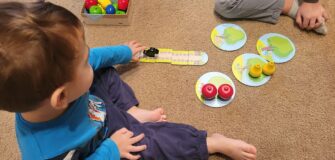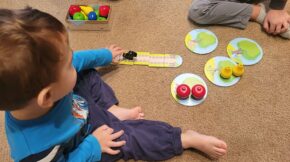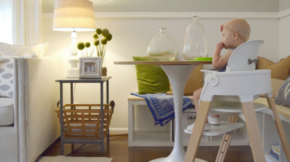Top Causes of Newborn Snoring and How to Address Them
Share

Being a new parent is an overwhelming feeling in itself. Even the slightest change can get on your nerves and make you panic. Listening to the snoring of your newborns can be fascinating and mesmerizing.
Each and every noise your child makes, including their cute snoring, seems to be adorable. Snoring can be cute, but it’s important to know its probable reasons and when it might need to be addressed.
Well, you don’t need to panic again if you haven’t paid much attention to your newborn’s snoring habits. We are here with a detailed blog where we discuss the subject of newborn snoring, investigating its numerous causes, and providing practical solutions to deal with this problem.
Before we move further to the remedies, let’s first understand why this happens and what causes newborn snoring.
What Leads a Baby to Snore?
There are several causes of newborn snoring, and figuring out the main one will help you decide if it’s a normal stage of your baby’s growth or something that needs further attention.
Let’s examine a few of the common causes of infant snoring.
- Narrow Airways: Babies have extremely small airways, and even a minor obstruction like mucus or another object can cause snoring. Perhaps it’s extremely important to take note of their sleeping patterns and breathing environment.
- Sleeping posture: Your baby’s airway may be considerably impacted by the posture in which they sleep, which ultimately causes them to snore. Some sleeping postures might cause momentary snoring, which might not be a permanent issue.
- Common Cold or Allergies: Especially when sleeping, a stuffy or runny nose brought on by a cold or allergies can induce snoring. This is often seen in chilly seasons like winter and monsoon or in times when the baby is allergic to anything in their environment.
- Enlarged Adenoids or Tonsils: Babies that snore may have enlarged tonsils or adenoids, which may cause breathing problems and contribute to snoring.
Note: Adenoids are a patch of tissue that is high up in the throat, just behind the nose.

- Sleep Apnea: Though uncommon in babies, sleep apnea is characterized by breathing pauses while you’re asleep, which might make you snore. So if anytime your baby is snoring occasionally and is comparatively louder than usual, it’s time you pay some attention to them.
- Reflux: If stomach acid leaks back into the throat due to gastroesophageal reflux disease (GERD), it may cause babies to snore.
- Overfeeding: It’s a pretty common scenario for new parents to overfeed their babies in the herd to give them proper nutrition and protein. However, new parents must ensure that they do not end up overfeeding their babies too often, as overfeeding can make infants snore and feel uncomfortable by causing them to swallow more air.
- Underlying Health Conditions: Infant snoring occasionally may be linked to other illnesses that need to be checked out. If you witness some changes in the snoring and fluctuations are experienced, you need to check for anybody’s temperatures and nose blocking or cold/flu.
- Exposure to secondhand smoking: Secondhand smoke exposure can aggravate a baby’s airways, causing irritation and snoring. Make sure the area is smoke-free for the sake of your child.
- Premature baby birth: Babies that are born prematurely may have undeveloped airways, which makes them more likely to snore. If you have any worries about a preterm delivery and how it can affect a child’s ability to breathe, speak with your pediatrician.
- Obesity or extra Weight: Obesity or extra weight in newborns can occasionally cause snoring. To avoid concerns with snoring brought on by being overweight, promote a balanced diet and lifestyle.

- Teething: The teething process can occasionally result in congestion and pain, which can induce momentary snoring. By offering teething alleviation techniques, these symptoms may be reduced.
- Dry Air: The baby’s room’s dry air might cause dry nasal passages, which increases the likelihood of snoring. A humidifier may be used to increase humidity in the air and lessen snoring brought on by dryness.
- Family History: If snoring runs in your family, your infant may be genetically predisposed to snoring. Any history of snoring or sleep apnea in the family should be disclosed to your pediatrician so they can help you out in dealing with the situation appropriately.
Knowing the many causes will help you decide if your baby’s snoring is a normal aspect of development or whether you need to consult a doctor.
Now that you are well-versed in the common causes of your baby snoring, it’s time for the solution. Let’s have a look at if your baby is snoring regularly and what remedies you can take help of.
What Do You Need to Do When Your Baby Snores?
It’s only normal for parents to worry about their children’s safety. Even while light snoring is frequently not harmful, there are some situations where intervention or changes may be helpful. So, read more on what you need to do at your level and when to consult a doctor for the extreme situation.
Here are some concrete actions you can take to stop your baby’s snoring.
- Keep Airways Clear: Use a bulb syringe to gently remove mucus from your baby’s airways if they have a runny or stuffy nose. Follow the correct instructions and be delicate while using this bulb syringe for your baby.

- The correct sleeping posture of your baby: Healthcare professionals advise putting your infant to sleep on their back since it can help prevent snoring and promote sound sleep.
- Humidify the Space: Keeping the air moist in your infant’s room with a cool-mist humidifier will assist in preventing nasal congestion and snoring.
- Elevate the Head: Elevating your baby’s head as will help with breathing and stopping snoring.
- Regular Checkups: Arrange routine checkups with your pediatrician to keep an eye on your baby’s health and development, as well as to address any snoring-related issues that may arise.
- Monitor the feeding process: Watch your baby’s feedings to make sure they are not being overfed since this might cause your baby to snore and cause them to swallow air.
- Create a Calm Sleep atmosphere: Make sure your infant sleeps in a peaceful, relaxing atmosphere. Reduce noise and other disturbances to encourage restful sleep.
- Nasal Drops for babies: Use nasal saline drops to assist your baby in breathing more easily and eliminate congestion if they have a stuffy nose. This will lessen the possibility that your baby may snore.
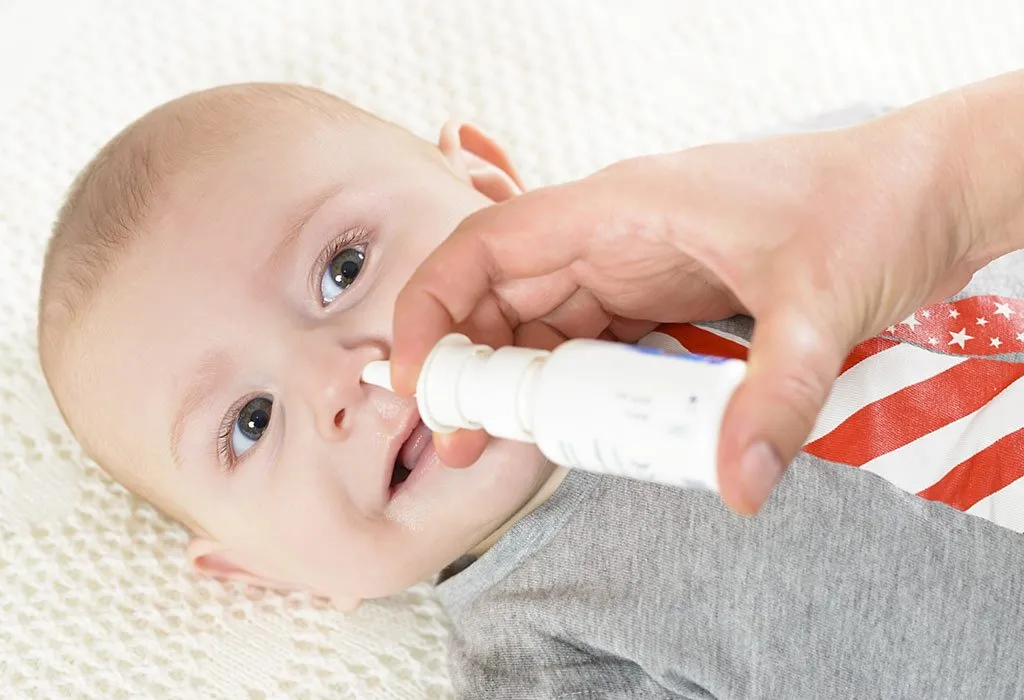
- Proper room temperature: Babies are very sensitive and can immediately be affected by the slightest change in their atmosphere. In order to make sure they sleep well, you need to keep an eye on the room’s temperature and set the temperature in a way that helps prevent congestion in the nose.
- Techniques for Breastfeeding: Your job while breastfeeding your baby is not fulfilled as you provide them with enough supplements. It has much more to look out for. If you’re nursing your infant, make sure you use positions that reduce the chance that your child may ingest too much air.
- Baby Massage: Who does not love massages? Well looks like the babies love it even more! A little baby massage before you put your babies to sleep can help them calm their muscles, which contributes to improving sleep quality and perhaps lessening snoring.
- Swaddle Comfortably: Swaddle your infant securely and comfortably to promote a sense of security and promote deeper, more restful sleep for your child.
- Limit Pacifier Use: Using a pacifier excessively might lead to your infant breathing through their mouth, which could lead to snoring. Observe and, if required, restrict the use of pacifiers.
- Keep Pets Away: To limit allergy exposure and potential snoring triggers, make sure pets do not sleep close to your baby’s cot if you have any.
- Encourage Regular Naps: By following a regular nap schedule, you can make sure that your baby receives enough rest during the day. Babies who get enough rest may snore less.
- Use an Infant Sleep Positioner: With a doctor’s advice, you could think about utilizing an infant sleep positionerto keep your baby’s head up while they sleep.
Just keep in mind that every baby is different, so what works for one baby might not work for another. Always put your baby’s comfort and safety first, and if you have any worries about your baby’s snoring or general health, go to a healthcare provider. Your infant can have restful evenings and healthy sleep thanks to your careful attention and encouragement.
So here we are ending the list of what all you can do from your end as a parent to give utmost comfort to your baby and prevent their snoring habit. Moving further, we pour some light on “When you should consult a Physician”?
When to Consult a Physician?
Although minor snoring is typical in infants and frequently goes away with time, there are a few situations when you should consult a doctor.
- Constant Snoring: It’s critical to see a pediatrician if your baby’s snoring continues despite treatment for an extended length of time without improvement. It’s important to see a pediatrician if your baby’s snoring lasts for a long time despite using home treatments and modifications. Continuous snoring may be a sign of an underlying problem that needs to be assessed and managed properly.
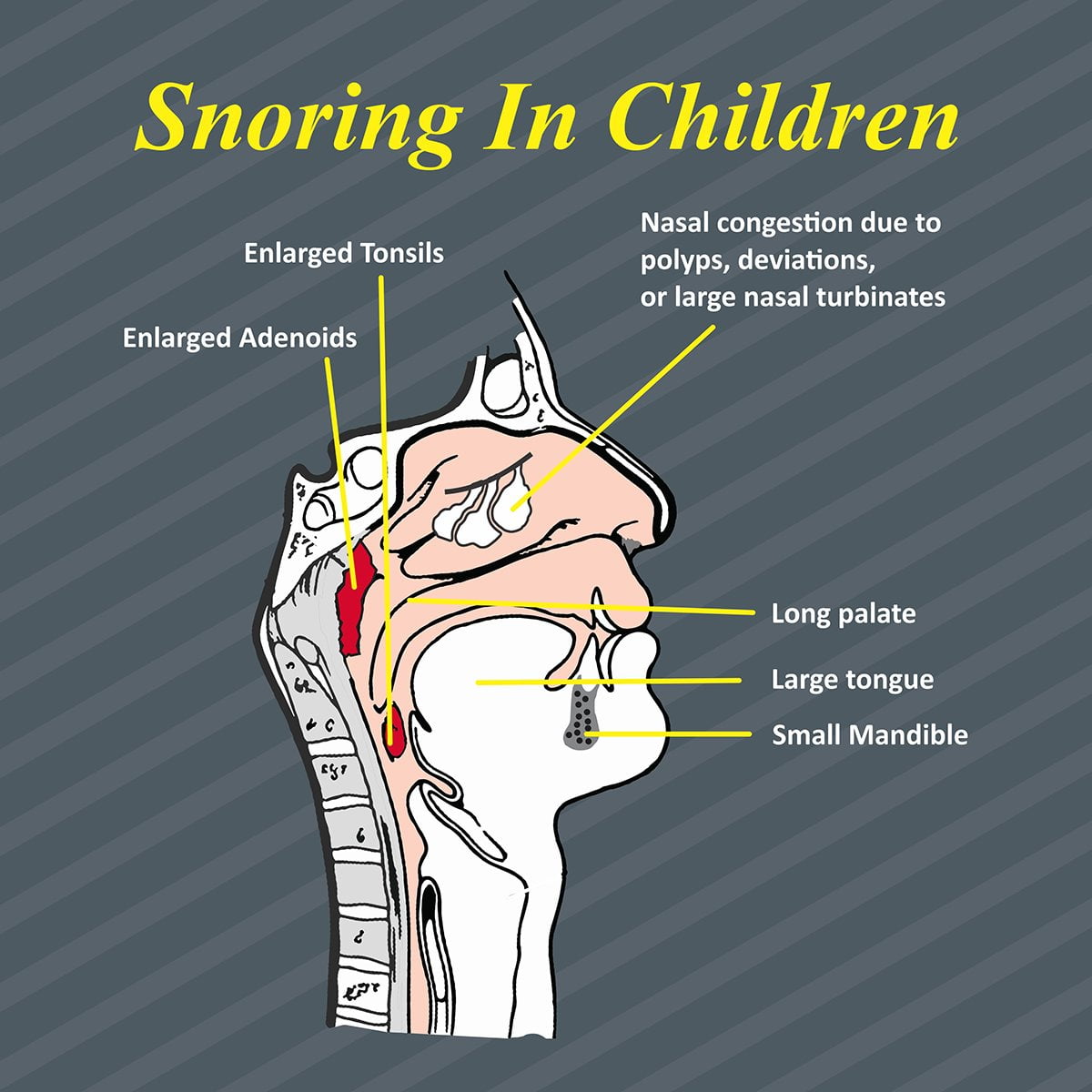
- Breathing Issues: If your infant has trouble breathing or breathes laboriously, get emergency medical help right away. It is critical to seek prompt medical assistance if you notice frequent pauses in your baby’s breathing while they are sleeping, a condition known as sleep apnea. A quick medical diagnosis of sleep apnea is necessary since it can be a dangerous condition.
- Breathing Interruptions: Sleep apnea, or breathing interruptions while your infant sleeps, has to be evaluated right away by a medical specialist. Snoring that is loud and followed by obvious breathing difficulties or gasping for air in your newborn may be a sign of obstructive sleep apnea. To solve this situation and guarantee your baby’s security while sleeping, speak with a pediatrician.
- Discomfort and Restlessness: If your infant snores or otherwise seems uncomfortable while sleeping, talk to your pediatrician about your worries. It may be an indication that snoring is impairing your baby’s sleep quality if they seem restless while they’re sleeping and exhibit indicators of discomfort, such as crying or frequent awakenings. To find viable solutions, discuss your problems with a healthcare expert.

- Respiratory issue while eating: When your baby has trouble breathing while eating, such as snorting or choking, it may be a sign that snoring is the cause of the problem or that your baby has another respiratory problem. To determine your baby’s eating habits and general health, seek medical assistance.
- Failure to Gain Weight: If your baby is facing difficulty in weight gain, it can be a possible sign for you to book an appointment to see a pediatrician right away. If your baby’s snoring habits are eventually distributing their ability to eat and develop, it means that it is causing them to fail to gain weight. Your baby’s healthy growth depends on proper assessment and care.
- Blue Discoloration of Lips or Skin: One of the easily noticeable signs new parents can use is If your baby’s lips or skin becomes blue during or after snoring episodes, it means it is an alert for you to immediately visit and consult your pediatrician as it is a sign that your baby is not getting enough oxygen. It may indicate a dangerous respiratory condition, so get medical help right now.

- High-Pitch or Whistling noises: If you experience your baby’s snoring to gain a high-pitch or whistling noise, it means they are facing an airway blockage while breathing, which ultimately may be the cause of your baby’s snoring. In such scenarios, it is highly recommended to seek a good medical evaluation that can assist in identifying the problem and the best course of action.
Summing Up!
Snoring by a newborn may be both adorable as well as unsettling for new parents. Perhaps It’s important to be watchful and aware of your baby’s health and well-being, even though it is frequently a normal aspect of a baby’s growth and passes with time.
It is advisable to monitor their activities and snoring habits to get hold of any issue coming the way or identify the problem at an early stage.
While keeping in mind these points, as mentioned earlier, you need to rest assured that your baby has a pleasant and comfortable sleeping environment.
Try to keep their surroundings as quiet and clean as possible so nothing intertwines with their rest time, and wake up lively and energized in the morning.
As a parent, things might turn bitter sometimes, but keep in mind that your instincts are important and that consulting a specialist will always provide you peace of mind. Having two opinions over one thing will eventually keep you calm and help you figure out things in a more effective way.
Happy parenting, and don’t forget to cherish each moment that comes along!









